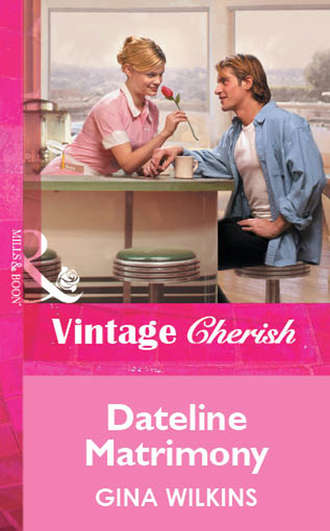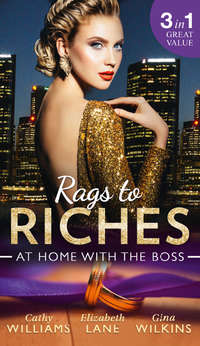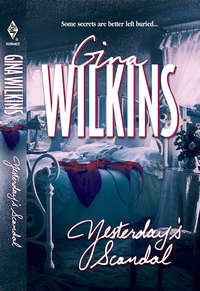
Полная версия
Dateline Matrimony
“Marjorie told me,” she said with a shrug that instantly deflated his swelling ego. “She tells me about nearly everyone who comes into the diner. She didn’t seem to think you’d mind.”
“Harmless gossip is one of Marjorie’s favorite pastimes. I wouldn’t dream of depriving her of it.” He tightened the last lug nut, then lowered and removed the jack. “Ready to roll.”
“I really do appreciate this, Mr. O’Neal. Thank you.”
“Riley,” he corrected her. “And you’re welcome.”
He loaded the jack and flat in her trunk and closed it with a snap. And then, because he could tell she was expecting him to make another attempt to flirt with her, he moved toward his own car. “Drive carefully, Teresa. See you around.”
She was still blinking in surprise when he closed his door and started his engine. He found himself grinning as he drove away after lingering only long enough to make sure she was safely in her own vehicle.
He had never liked being overly predictable. But he would be flirting with her again eventually. It was too much fun to resist.
Chapter Two
Riley had never dealt well with rejection. It was a facet of his personality that he freely acknowledged and accepted as unalterable. He would even go so far as to admit that he was rather spoiled to having his own way.
An indulged only child of older parents and the only grandson on either side of his family, he’d never had to compete for attention or affection. Grades and friends had come easily to him in school, and he had enough trust money from his late grandparents to allow him to live comfortably, if not lavishly.
His job with the Edstown Evening Star was hardly lucrative, but he enjoyed it for the most part. It forced him to interact with other people on a regular basis, counteracting his natural inclination to hole up alone with his books, his music and his imagination. And yet the undemanding structure of the job gave him plenty of freedom to do just that when he wanted. He’d been known to disappear into the duplex apartment he owned for days at a time without making an appearance unless he was truly needed at the newspaper.
It was probably his aversion to rejection that had kept him from submitting one of his fantasy novels to a publisher. While characteristically confident about his talent, he was realistic enough to accept that most aspiring writers had to deal with at least a few rejections along the road to publication. He wasn’t sure how he would react to anyone turning down his submission. Until he was ready to find out, he told himself he was content writing for his own pleasure.
He’d rarely encountered rejection from women, either. Maybe it was because he didn’t issue invitations without being fairly confident they would be accepted, but his success rate in that area—as in the other parts of his life—was quite high. He had definitely become spoiled.
Teresa Scott was threatening to ruin his impressive record.
Emboldened by their amiable encounter on the side of the road, he’d asked her out three times during the past two weeks. Though she’d been friendlier to him since he’d changed her tire for her, she’d turned him down every time. Politely, even amusingly, but very firmly. She’d made it clear enough that there was no reason for him to keep asking, but that hadn’t stopped him.
So far, he’d asked her to dinner, to a movie and to a high school football game that he had to cover for the paper. Rather than becoming annoyed or discouraged by her consistent rebuffs, he was beginning to see them as a form of entertainment. He figured he might as well keep asking—just to watch her reactions. And who knew, she might change her mind if he was persistent enough.
She filled his coffee cup on the Friday morning almost three weeks after their first meeting. “What would you like today?” she asked.
“A date with you,” he replied promptly. “How about tonight?”
“I’m painting my fingernails tonight. What do you want for breakfast?”
Chuckling at her rejection, he replied, “I’m in the mood for oatmeal today. With fruit, toast and coffee. How’s your schedule for tomorrow night? Are you free then?”
“No, that’s when I paint my toenails to match my fingernails. I’ll go turn in your order now.”
She’d shot him down again, but he was pretty sure he’d seen a fleeting glimmer of amusement in her blue eyes. Maybe he hadn’t won her over yet—but she found him somewhat entertaining. It was a start.
Okay, so he was reaching, he admitted with a wry smile as he lifted his coffee cup. But still, there was always a chance….
“Hey, Riley.”
Glancing up, Riley smiled. “Hey, Chief. What’s up?”
Chief of Police Dan Meadows slid into a chair on the other side of Riley’s table without waiting for an invitation—but then, he knew he didn’t need one. “Lindsey’s covering some sort of early meeting this morning, so I’m on my own for breakfast.”
Riley shuddered dramatically. “It’s the annual PTA breakfast at the middle school. Some bigwig from the state department of education is there to make a speech, and a bunch of sixth graders are putting on a musical production. Lindsey offered me the assignment, but I let her take it—I knew she’d hate to miss a program like that.”
Dan chuckled. “Very noble of you.”
“I thought so. I’m sure glad you married Lindsey and convinced her to stay in Edstown instead of taking a job with one of the big newspapers. If she’d left, I’d be the one listening to a bunch of moppets warbling off-key at this hour in the morning.”
“Happy to oblige.”
Riley found his friend’s drawled response amusing—as if Dan had only wed Lindsey a few weeks ago to keep her from leaving the Evening Star. Lindsey had been in love with Dan for years—but Dan had been a bit slower to acknowledge his feelings. He’d made up for that by losing no time marrying her. Dan wasn’t one to put his emotions on display, but Riley had noticed a new glow of contentment in his friend’s eyes since the wedding.
Teresa returned to set Riley’s breakfast in front of him. She glanced at Dan, who was studying her curiously. “Good morning. Would you like a menu?”
“No, that’s not necessary. I’ll have scrambled eggs, ham and grits.”
“Toast or biscuits?”
“Toast.”
Riley looked from one to the other. “Have you two been introduced? No? Teresa Scott, this is Dan Meadows.”
“It’s nice to meet you, Ms. Scott.”
“You, too, Mr. Meadows.”
“Chief Meadows,” Riley corrected her. “Dan’s chief of police here in Edstown.”
Teresa looked momentarily surprised, but she recovered quickly. “Is that right?”
“Yes, ma’am,” Dan drawled. “You be sure and let me know if there’s anything I can do for you, you hear?”
While Riley grinned at his friend’s old-west-lawman imitation, Teresa nodded. “Well, actually, I have encountered one suspicious character since I moved here.”
“Who’s that, ma’am? Someone I should keep an eye on?”
“Looks like you already are,” she replied, glancing pointedly toward Riley. “I’ll be right back with your coffee, Chief.”
Dan was smiling when Teresa walked away. “I think she just zinged you, pal.”
“Trust me, it’s not the first time she’s done so.”
“She seems nice.”
Riley nodded and dug into his cooling breakfast.
“Pretty, too,” Dan added, glancing across the room.
“I noticed.”
“Have you asked her out?”
“Yep.”
“And…”
“Crashed and burned. Every time.”
Dan chuckled. “Pretty and intelligent.”
Teresa returned to set a mug of coffee in front of Dan. “Your breakfast will be ready soon.”
“Hey, Teresa, there’s a symphony concert in Little Rock next weekend. Want to go with me?” Riley asked.
“Sorry. I’m washing my hair that night,” she answered pleasantly.
“I didn’t tell you which night the concert’s being held,” he reminded her.
She didn’t miss a beat. “I didn’t say which night I’m washing my hair.”
“Oh, man.” Dan shook his head as Teresa moved away. “You went down in flames, buddy.”
“Yeah, but did you see her eyes? She said no, but what she wanted to say was—”
“Hell, no.”
Riley snorted in response to Dan’s droll interruption. “Scoff if you like—but I’m getting to her. She won’t be able to resist my charms much longer.”
“Is that right?” Dan glanced up when Teresa set his breakfast on the table. “Riley thinks he’s getting to you,” he said gravely.
“He’s right,” she murmured, refilling their coffee cups. “He’s definitely getting on my nerves.”
“You know, we should talk about that. How about over dinner tonight?” Riley suggested.
“Sorry. I’m going to be ill tonight. Excuse me, I have orders to serve.”
“I think I like her,” Dan murmured appreciatively.
“Just help me pull this knife out of my chest, will you?” Riley pantomimed the motion as he spoke.
“A knife?” Dan asked blandly. “Or is that one of Cupid’s arrows?”
“Very funny. Eat your breakfast.”
Dan obligingly picked up his fork, though his brown eyes still gleamed with amusement that was most definitely at Riley’s expense.
Okay, so the guy was amusing. Teresa had found herself looking forward to the days when Riley O’Neal had breakfast in the diner.
She wasn’t particularly flattered by his frequent invitations for dates. She suspected that he was the type who’d make a play for any reasonably attractive new woman who entered his life. But it was still nice to see a look of appreciation in an attractive man’s eyes. It gave her a glimmer of hope that someday…maybe…she’d meet someone to share her life with again. Someday far in the future.
“I think he’s got a thing for you.” Marjorie Schaffer winked at Teresa as she whispered her revelation.
Looking up from the table she was wiping with a damp cloth, Teresa wrinkled her nose. “Old Ernie? I think he proposes to every woman who crosses his path.”
“Of course he does. Ernie even proposes to me at least twice a week. But I was talking about Riley O’Neal. Everyone has noticed the way he’s been coming in here almost every day to flirt with you.”
“Riley’s as much of a habitual flirt as old Ernie. I don’t take either of them seriously.”
“He sure has been coming around a lot since you started working here. Used to be he’d only eat here once or twice a month, tops. Now it’s three or four times a week.”
“Really?” Teresa was a bit surprised by that. She’d assumed Riley had always been a regular. She found it hard to believe he’d changed his daily schedule just because she was serving coffee here.
Maybe it was a little flattering….
She hefted a tray of dishes and moved toward the doorway. “I’ll leave you to your romantic fantasizing,” she teased her friend and employer lightly. “I have customers waiting.”
Teresa was still thinking about Marjorie’s words as she approached Riley’s table with the coffee carafe a few minutes later. Maybe he really was interested in taking her out. Not that she was in a position to get involved with anyone, but it gave her something to daydream about.
She stopped at the table next to the one where Riley and his friend were conversing as they finished their breakfasts. As she refilled the cups of the middle-aged couple sitting there, she couldn’t help overhearing a snatch of Riley’s conversation.
“I hope your wife’s enjoying the middle school program,” Riley was saying to the police chief. “I’d rather eat mud pies myself than listen to that bunch of kids mangling Disney movie songs.”
Dan chuckled. “You know you don’t really dislike kids as much as you pretend.”
“Nah, they’re okay. As long as I don’t actually have to listen to them sing, or watch them dance or act in school plays. Or share a plane ride with them. Or a movie theater. Or a restaurant. Or—”
Dan was laughing quietly when he cut in. “Okay, I get the picture.”
So did Teresa.
She wasn’t really disappointed, she assured herself. She hadn’t seriously considered accepting a date with him. She wasn’t interested in dating anyone right now. Especially a man who’d just made it crystal clear how entirely wrong he was for her.
She filled the police chief’s cup first, and then Riley’s. “Is there anything else I can get for you gentlemen?”
“I’ll take the check,” Riley said. “I like to stay on the chief’s good side—just in case I ever need a ticket fixed or anything.”
“I wish you’d stop saying things like that,” Dan said, sounding rather exasperated. “People who don’t know better might think there’s some truth in what you’ve implied.”
Teresa smiled faintly. “Don’t worry, Chief. I take very little of what he says seriously.”
“I said she was intelligent,” Dan said to Riley, who was giving Teresa an exaggeratedly aggrieved look.
“If there’s nothing else you need, I’ll get your check,” she said, taking a step back from the table.
“You’re sure you won’t reconsider my dinner invitation for tonight?” Riley asked enticingly.
“I’m quite sure,” she said in a tone cool enough to freeze the smile from his face. No teasing this time—no humorous rejoinders or implied maybes. This was a flat-out no, and she wanted him to recognize it as such.
There was no need for either of them to harbor the delusion that there would ever be a date—or anything else—between them.
Riley didn’t make a habit of talking to kids. For one thing, he never knew quite what to say to them. And parents frowned on strangers approaching their offspring—rightly so, of course. So, all in all, it seemed safer to just stay away from the tykes.
He was sitting in a city park with a book on a pleasantly cool afternoon during the first week of October when a snub-nosed urchin approached him.
“Hi,” the kid—who looked to be about ten—said.
Resting the paperback on his knee, Riley studied the boy a moment before coming to the conclusion that he’d never seen him before. “Hi.”
“Whatcha doing?”
Riley sat on a concrete picnic bench, his back to the table, facing the small, pretty lake that was the center of the park. A can of soda and the remains of a burger and fries were scattered on the table behind him. He figured it was pretty obvious that he was taking advantage of a nice, warm day to picnic, read and commune with nature for a while, but apparently the boy was simply trying to start a conversation.
“I’m just taking a break from work,” he said. “What are you doing?”
“I’m going to feed the ducks.” The boy held up a clear plastic bag filled with bread cubes.
Riley looked toward the lake, where several hungry-looking ducks were starting to congregate nearby, apparently deciding the boy looked like a promising food source. “I’m sure they’ll like that. How come you aren’t in school?”
“No school today,” the kid announced with pleasure. “It’s a teacher workday.”
Glancing around at the few other people in the park, none of whom seemed to be monitoring the boy’s actions, Riley asked, “You aren’t here by yourself, are you?”
“No, my sitter’s with me. Well, she’s in the rest room with my little sister. I’m supposed to wait for them before I start feeding the ducks, because Maggie gets mad if I start without her.”
“Maggie’s your sister?”
“Yep. My name’s Mark.”
Because it seemed like the right thing to do, Riley extended his hand. “Nice to meet you, Mark. I’m Riley.”
The boy pumped Riley’s hand gravely. “It’s nice to meet you, too. Now you’re not a stranger, right? It’s okay for us to talk, right?”
Riley couldn’t help chuckling. “Weren’t we strangers a few minutes ago—when you first spoke to me?”
The boy gave the question only a moment’s consideration before replying airily, “I was just being polite then.”
Although amused by the kid’s logic, Riley thought it was probably time for him to offer some wise-adult advice. “Maybe you’d better not be quite so polite to strangers when your sitter isn’t around.”
“I don’t talk to bad strangers,” Mark replied confidently. “Only nice ones like you.”
“But…” Riley paused and drew a deep breath, feeling himself hovering on the verge of stammering. This kid had an answer for everything. Must keep his parents on their toes all the time.
“Uh-oh! Mark’s talking to a stranger again. I’m going to tell Mom.”
The shrill announcement from behind them brought Mark’s chin up defensively. “He’s not a stranger. His name’s Riley and he’s my friend.”
The teenager trailing after Mark’s blond, blue-eyed little sister was someone Riley recognized. “Hi, Jenny.”
Her heavily mascaraed eyes lit up. “Hey, Riley. What are you doing here?”
“You know each other?” Mark seemed pleased.
“Oh, sure, I’ve known Jenny since she was younger than you.”
“Riley used to date my older sister,” Jenny confided to Mark with a giggle. “But she stopped going out with him because he wasn’t the marrying kind and she wanted someone who was.”
Riley cleared his throat and quickly changed the subject. “So your school is out today, too, Jenny?”
“Yes. They all are. So I’m making a little extra money watching my neighbor’s kids until their mom gets off work.”
Mark and Maggie had already headed for the hopeful-looking ducks that had gathered on the grass at the edge of the lake. The moment Mark reached a hand into the bag and tossed a handful of bread cubes onto the ground, the ducks went wild, quacking and jostling for the food, making the children laugh at their eager antics.
“This is just a suggestion,” Riley murmured to Jenny, “and of course I don’t know much about kids or baby-sitting, but you might want to keep a closer eye on Mark. He’s pretty chatty with strangers.”
Jenny bit her lip. “I know. The kid’s a real talker, and he’s curious about everyone and everything. His mom says he’s probably going to be a politician or something because he wants to talk to everyone he sees. I told him to stay close to the rest rooms while I was inside with his sister, but I guess he saw you and just couldn’t resist striking up a conversation. I’ll talk to him about it on the way home.”
“Good idea. He needs to know he can’t just start talking to any strange guy sitting in a park.”
Jenny giggled again. “You’re not a strange guy.”
“Your sister might disagree with that comment,” Riley murmured, his smile wry.
“Hey, Riley,” Mark shouted. “You want to feed a duck?”
Riley reached for the portion of bun left over from his hamburger. “Feeding ducks just happens to be one of my favorite pastimes.”
It was another generally held misconception that Riley didn’t like children. It was true he didn’t go to great lengths to seek them out, so he hadn’t spent a great deal of time with them on the whole, but he didn’t actively dislike them.
He enjoyed the time he spent feeding the ducks with Mark, Maggie and Jenny. Mark chattered almost endlessly, pelting Riley with a barrage of questions and humorous comments. A bit more shy at first, Maggie soon joined in the fun, treating Riley like a longtime friend, much the same way Jenny behaved toward him.
Knowing there were several people who’d be surprised to see him in this situation, Riley still had a good time. Cute tots, he thought. If more kids were as entertaining and well-behaved as these two—or three, if one counted a teenager as a kid—Riley wouldn’t feel compelled to avoid them quite so often.
Still, it wasn’t long before he glanced at his watch and said, “I’d better be going. I have a lot to do this afternoon.”
Jenny checked the time on her own watch. “Oh, gosh, we’d better go, too. The kids’ mom will be home soon.”
It was only two-thirty in the afternoon. Apparently, Mark and Maggie’s mom worked the early shift. A part-time job, perhaps.
“It was great seeing you, Riley,” Jenny said as she herded her charges toward the parking area.
“You, too. Give my best to your family.”
“I will. Bye, Riley.”
“Bye, Riley,” Maggie parroted, waving.
“See ya around, Riley,” Mark called over his shoulder.
“Yeah. See you around.” Who knew…it was a small town. Maybe they would see each other around sometime.
It occurred to him only then that he’d never gotten the kids’ last name. It was entirely possible that he knew their parents, though he couldn’t place them with anyone at the moment.
Cute kids, he thought again as he drove his car out of the parking lot. Their parents were obviously doing something right raising them. Not a job he wanted himself—way too much responsibility and pressure for Riley—but some folks seemed to have a talent for it.
He just didn’t happen to be one of them.
Chapter Three
For some reason, Riley’s thoughts were turned to past events as he entered the Edstown High School football stadium that weekend, along with a crowd of local football fans.
It had been several months since young Eddie Stamps had been arrested for arson, bringing an end to a troubling series of local fires. Most of the buildings that had burned had been vacant, the fires more of a nuisance than a dangerous threat to the community. Two of the fires had had more serious repercussions.
The Hightower Insurance office had burned to the ground, destroying valuable personal records and expensive office equipment. Five employees had lost their jobs, since R. L. Hightower had decided to retire rather than rebuild. The most devastating incident had occurred two months before the insurance company fire, in mid-January. A small hunting cabin in the woods just outside of town had burned, killing Truman Kellogg, who’d died in bed of smoke inhalation.
Unlike the other fires, that had been the only one in which there’d been no clear-cut evidence of arson. The cause was still listed as undetermined. It had been a fluke that Kellogg had even been at his hunting cabin that night. He had visited it only infrequently during the past few years and almost never at that time of the year.
Eddie Stamps had finally confessed to most of the arsons, yet denied responsibility for the insurance company and the hunting cabin. Most locals believed he was willing to confess only to the fires with the least serious consequences, hoping for a lesser sentence. Dan had pointed out to Riley that there were some differences in those two fires, but he, too, suspected that Eddie might have been involved with them. The timing seemed too coincidental to believe otherwise.
Dan tended to believe that Truman’s death had been accidental. Since Truman so rarely stayed at the cabin, it was conceivable that the arsonist—if there was one in that case—could have believed the cabin was vacant. Because prosecutors had reluctantly decided to accept a plea bargain from Eddie’s attorney and charge him only with the fires he’d confessed to, it was possible no one would ever know whether Truman’s death had been the result of arson or merely a tragic accident.
Since Eddie’s arrest, news had been slow for the two reporters for the Evening Star. Lindsey stayed busy covering school programs and civic meetings and doing features on interesting locals. She shared hard news coverage with Riley, informally taking turns showing up when real news occurred. Riley’s regular responsibilities included attending and reporting on weekly city council meetings and sporting events and a twice-weekly column of biting political and social commentary.
The column was new, an idea of managing editor Cameron North. At first Riley had been reluctant to commit to the demands of a regular column. Cameron had talked him into it, assuring Riley that he could do most of his work at home, giving him plenty of freedom to work his own hours at his own pace, on the condition that he would produce two columns a week.
Riley enjoyed writing the columns more than he’d expected. It gave him a chance to get in a few digs at the mayor, the city council, local society leaders, the school board—he liked to think of himself as an equal opportunity needler. Even his friends weren’t entirely safe from his barbs. Dan and his police department had taken their share of hits from Riley’s keyboard.









